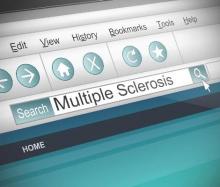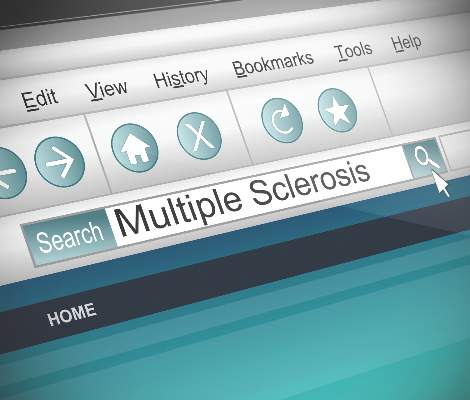User login
INDIANAPOLIS – Lack of adherence was significantly higher in multiple sclerosis (MS) patients who received oral versus injectable disease-modifying therapies, a single-center study showed.
Side effect profile may have been a contributing factor to this outcome, study author Caitlin Dionne said in an interview during a poster session at the annual meeting of the Consortium of Multiple Sclerosis Centers. “There are more GI-related side effects with the oral MS drugs, compared with the injectables, so that could be part of it,” said Ms. Dionne, a registered nurse in the neurology department at the Lahey Clinic Outpatient Center, Lexington, Mass. In addition, taking an oral DMT “may not be as serious in the minds [of patients] as ‘I have to take a shot.’”
In an effort to determine if adherence and tolerability of oral disease-modifying therapies (DMTs) is better than with injectables, Ms. Dionne and her associates developed the MS Treatment Adherence Questionnaire (MS-TAQ) and collected data from October and November of 2014. The questionnaire is composed of six questions related to a patient’s current DMT: number of missed doses in 4 weeks, reason dose was missed, perceived side effects, ease of administration, and medication satisfaction. Medication types were divided into three groups: oral DMTs, subcutaneous or intramuscular (SC/IM) DMTs, and monthly IV injections.
Of the 209 patients surveyed, 75% were female and their mean age was 50. A similar number of patients were on oral and SC/IM medications (89 and 90, respectively), while the remaining 30 were on an IV infusion. Ms. Dionne reported that 55% of patients taking oral medications reported missing no doses, compared with 71% of those taking SC/IM agents and 93% of those receiving IV infusions (P = .005). Ease of medication administration was reported by 77% of patients taking oral medications, 60% of those taking SC/IM agents, and 33% of those receiving IV infusions (P < .0001).
Reasons for missing a dose differed with respect to each DMT type (P = .017), with forgetfulness being reported in 38% and 27% of patients taking oral and SC/IM agents, respectively. Side effects also differed with respect to each DMT. Nearly three-quarters (74%) of those receiving IV infusions did not experience side effects, compared with 19% of those taking oral medications and 20% of those taking SC/IM agents.
The researchers had no relevant financial conflicts to disclose.
On Twitter @dougbrunk
INDIANAPOLIS – Lack of adherence was significantly higher in multiple sclerosis (MS) patients who received oral versus injectable disease-modifying therapies, a single-center study showed.
Side effect profile may have been a contributing factor to this outcome, study author Caitlin Dionne said in an interview during a poster session at the annual meeting of the Consortium of Multiple Sclerosis Centers. “There are more GI-related side effects with the oral MS drugs, compared with the injectables, so that could be part of it,” said Ms. Dionne, a registered nurse in the neurology department at the Lahey Clinic Outpatient Center, Lexington, Mass. In addition, taking an oral DMT “may not be as serious in the minds [of patients] as ‘I have to take a shot.’”
In an effort to determine if adherence and tolerability of oral disease-modifying therapies (DMTs) is better than with injectables, Ms. Dionne and her associates developed the MS Treatment Adherence Questionnaire (MS-TAQ) and collected data from October and November of 2014. The questionnaire is composed of six questions related to a patient’s current DMT: number of missed doses in 4 weeks, reason dose was missed, perceived side effects, ease of administration, and medication satisfaction. Medication types were divided into three groups: oral DMTs, subcutaneous or intramuscular (SC/IM) DMTs, and monthly IV injections.
Of the 209 patients surveyed, 75% were female and their mean age was 50. A similar number of patients were on oral and SC/IM medications (89 and 90, respectively), while the remaining 30 were on an IV infusion. Ms. Dionne reported that 55% of patients taking oral medications reported missing no doses, compared with 71% of those taking SC/IM agents and 93% of those receiving IV infusions (P = .005). Ease of medication administration was reported by 77% of patients taking oral medications, 60% of those taking SC/IM agents, and 33% of those receiving IV infusions (P < .0001).
Reasons for missing a dose differed with respect to each DMT type (P = .017), with forgetfulness being reported in 38% and 27% of patients taking oral and SC/IM agents, respectively. Side effects also differed with respect to each DMT. Nearly three-quarters (74%) of those receiving IV infusions did not experience side effects, compared with 19% of those taking oral medications and 20% of those taking SC/IM agents.
The researchers had no relevant financial conflicts to disclose.
On Twitter @dougbrunk
INDIANAPOLIS – Lack of adherence was significantly higher in multiple sclerosis (MS) patients who received oral versus injectable disease-modifying therapies, a single-center study showed.
Side effect profile may have been a contributing factor to this outcome, study author Caitlin Dionne said in an interview during a poster session at the annual meeting of the Consortium of Multiple Sclerosis Centers. “There are more GI-related side effects with the oral MS drugs, compared with the injectables, so that could be part of it,” said Ms. Dionne, a registered nurse in the neurology department at the Lahey Clinic Outpatient Center, Lexington, Mass. In addition, taking an oral DMT “may not be as serious in the minds [of patients] as ‘I have to take a shot.’”
In an effort to determine if adherence and tolerability of oral disease-modifying therapies (DMTs) is better than with injectables, Ms. Dionne and her associates developed the MS Treatment Adherence Questionnaire (MS-TAQ) and collected data from October and November of 2014. The questionnaire is composed of six questions related to a patient’s current DMT: number of missed doses in 4 weeks, reason dose was missed, perceived side effects, ease of administration, and medication satisfaction. Medication types were divided into three groups: oral DMTs, subcutaneous or intramuscular (SC/IM) DMTs, and monthly IV injections.
Of the 209 patients surveyed, 75% were female and their mean age was 50. A similar number of patients were on oral and SC/IM medications (89 and 90, respectively), while the remaining 30 were on an IV infusion. Ms. Dionne reported that 55% of patients taking oral medications reported missing no doses, compared with 71% of those taking SC/IM agents and 93% of those receiving IV infusions (P = .005). Ease of medication administration was reported by 77% of patients taking oral medications, 60% of those taking SC/IM agents, and 33% of those receiving IV infusions (P < .0001).
Reasons for missing a dose differed with respect to each DMT type (P = .017), with forgetfulness being reported in 38% and 27% of patients taking oral and SC/IM agents, respectively. Side effects also differed with respect to each DMT. Nearly three-quarters (74%) of those receiving IV infusions did not experience side effects, compared with 19% of those taking oral medications and 20% of those taking SC/IM agents.
The researchers had no relevant financial conflicts to disclose.
On Twitter @dougbrunk
AT THE CMSC ANNUAL MEETING
Key clinical point: MS patients were less adherent to oral than to injectable disease-modifying therapies.
Major finding: Just over half of MS patients taking oral medications (55%) reported missing no doses, compared with 71% of those taking SC/IM agents and 93% of those receiving IV infusions (P = .005).
Data source: Survey responses from 209 MS patients at the Lahey Outpatient Center, Lexington, Mass.
Disclosures: The researchers had no relevant financial conflicts to disclose.

